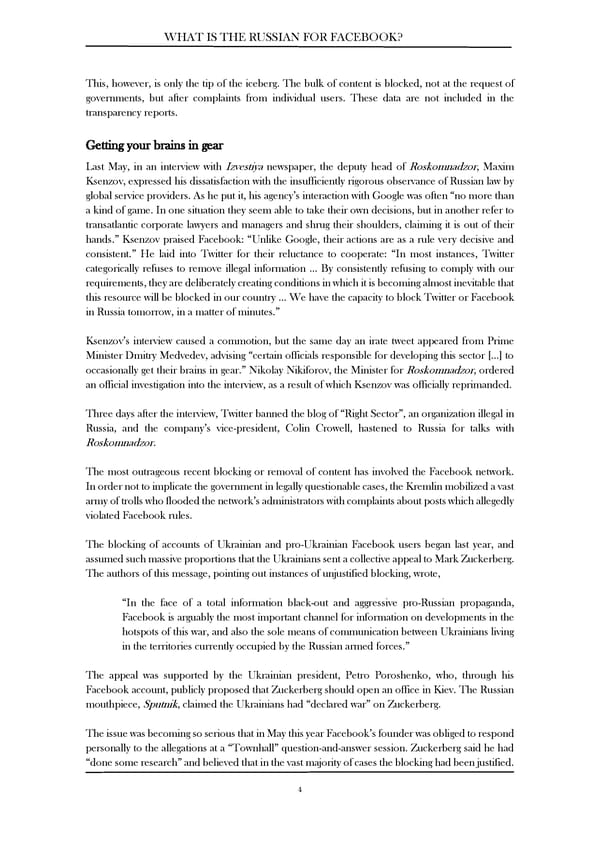WHAT IS THE RUSSIAN FOR FACEBOOK? This, however, is only the tip of the iceberg. The bulk of content is blocked, not at the request of governments, but after complaints from individual users. These data are not included in the transparency reports. Getting your brains in gear Last May, in an interview with Izvestiya newspaper, the deputy head of Roskomnadzor, Maxim Ksenzov, expressed his dissatisfaction with the insufficiently rigorous observance of Russian law by global service providers. As he put it, his agency’s interaction with Google was often “no more than a kind of game. In one situation they seem able to take their own decisions, but in another refer to transatlantic corporate lawyers and managers and shrug their shoulders, claiming it is out of their hands.” Ksenzov praised Facebook: “Unlike Google, their actions are as a rule very decisive and consistent.” He laid into Twitter for their reluctance to cooperate: “In most instances, Twitter categorically refuses to remove illegal information ... By consistently refusing to comply with our requirements, they are deliberately creating conditions in which it is becoming almost inevitable that this resource will be blocked in our country ... We have the capacity to block Twitter or Facebook in Russia tomorrow, in a matter of minutes.” Ksenzov’s interview caused a commotion, but the same day an irate tweet appeared from Prime Minister Dmitry Medvedev, advising “certain officials responsible for developing this sector [...] to occasionally get their brains in gear.” Nikolay Nikiforov, the Minister for Roskomnadzor, ordered an official investigation into the interview, as a result of which Ksenzov was officially reprimanded. Three days after the interview, Twitter banned the blog of “Right Sector”, an organization illegal in Russia, and the company’s vice-president, Colin Crowell, hastened to Russia for talks with Roskomnadzor. The most outrageous recent blocking or removal of content has involved the Facebook network. In order not to implicate the government in legally questionable cases, the Kremlin mobilized a vast army of trolls who flooded the network’s administrators with complaints about posts which allegedly violated Facebook rules. The blocking of accounts of Ukrainian and pro-Ukrainian Facebook users began last year, and assumed such massive proportions that the Ukrainians sent a collective appeal to Mark Zuckerberg. The authors of this message, pointing out instances of unjustified blocking, wrote, “In the face of a total information black-out and aggressive pro-Russian propaganda, Facebook is arguably the most important channel for information on developments in the hotspots of this war, and also the sole means of communication between Ukrainians living in the territories currently occupied by the Russian armed forces.” The appeal was supported by the Ukrainian president, Petro Poroshenko, who, through his Facebook account, publicly proposed that Zuckerberg should open an office in Kiev. The Russian mouthpiece, Sputnik, claimed the Ukrainians had “declared war” on Zuckerberg. The issue was becoming so serious that in May this year Facebook’s founder was obliged to respond personally to the allegations at a “Townhall” question-and-answer session. Zuckerberg said he had “done some research” and believed that in the vast majority of cases the blocking had been justified. 4
 What is the Russian for Facebook? Page 4 Page 6
What is the Russian for Facebook? Page 4 Page 6